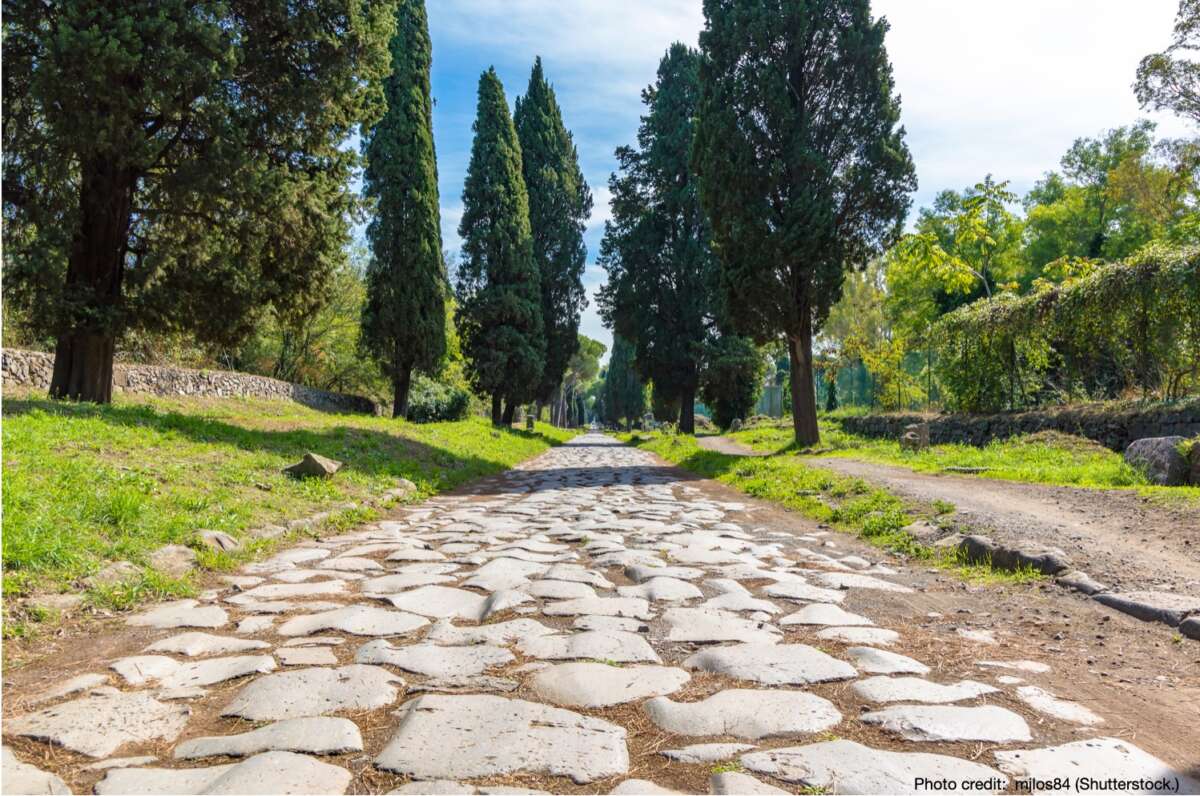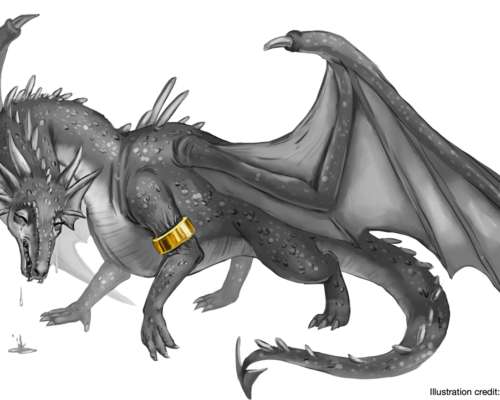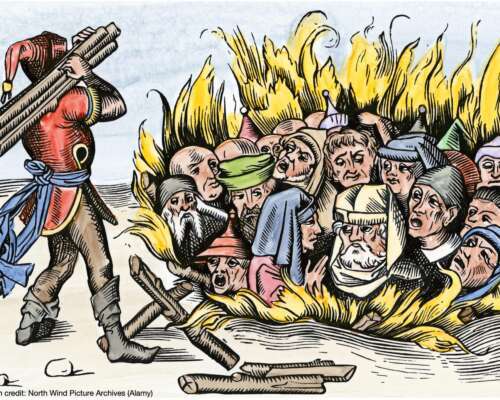The featured photo in this post is a famous road in Italy called the Via Appia or sometimes the Appia Antica. The road you see in the photo is the same as it looked when Caesar rode on it. In fact, the road was built (in 312 B.C.) by Roman civil engineers before Caesar’s grandfather was even born. It ran from Rome 162 miles (261 km) to Tarentum (now Taranto.) The flagstones in the photo were carefully chosen and placed by the Roman engineers and if Caesar were alive today, he might remember it well. It is arguably the oldest road in the world still in use. Notice how straight the road is. This is because the Roman engineers carefully surveyed their roads and followed strict, standardized building codes that Rome had enacted.
The Apostle Paul wrote a letter (epistle) to the church in Rome around 57 or 58 A.D. and he included in various places in his letter those verses that contain the plan of salvation. Christians in the past century have taken these six or seven verses and sequenced them in a logical way and these verses and this sequence have become known as the “Romans Road.” So, let’s explore this “road” and walk down it together.
Why call this post “The Breadcrumb Trail?”

The fairy tale “Hansel and Gretel” is one of Wilhelm and Jacob Grimm’s more famous stories. Published in 1812, it describes the plight of a small boy and his equally young sister who live with their improvised father and their uncaring stepmother, who rules the roost. The stepmother demands that her husband, a woodcutter, take the children deep into the forest and abandon them there, to the mercy of wild beasts. But Hansel, aware of the scheme, fills his pockets with shiny stones and drops them at intervals as they tread deeper and deeper into the forest. After being left behind by their loving but hen-pecked father, the children find their way home by following the stones. They receive a warm greeting of relief from their father, but a frosty one from their stepmother, who again cajoles her husband to abandon them in the forest. This time, Hansel uses bed-crumbs to leave a trail. But when he and his sister search for the crumbs to retrace their steps home, they discover that birds have eaten the crumbs, and now they cannot return home. Eventually, they are imprisoned by a witch who fattens the children up so that she can feast on them.
No fear! The story has a happy ending (except for the witch, of course) and the story is worth rereading. Again, the Brothers Grimm have a tale with familiar themes. The first theme deals with familial relationships and is as relevant today as anything ever written by Shakespeare. Many people today from blended families can relate to friction with stepparents. While many stepparents and stepsiblings are loving, nurturing people—perhaps more so than biological family members in some instances, others are mean, cruel (or worse.)
Sociologists will tell you that family violence in today’s society is more often perpetrated on children by an incoming male than a biological parent. This is consistent with a concept called Social Darwinism. Social Darwinism reasons that a nonbiological male wants the female to promote and attend to his own gene pool, rather than that of an absent male, and in nature, orphaned offspring often suffer with their well-being or their very lives. Psychologists call this the “Cinderella Effect.” We see this in the animal kingdom as well.
There is also the abandonment that Grimm’s characters felt and which we, ourselves, sometimes feel today. This happens when a parent dies, or a relationship ends, or we fall on hard times. Yet, Scripture tells us that we are never alone. I recall reading about teenagers during this present pandemic who committed suicide because they felt an unbearable loneliness or abandonment, themselves, during “lockdown,” even while having access to television and social media. God made us to be social creatures and did not intend for us to live sterile, solitary lives apart from others of our species as a rule. The need to extinguish the coronavirus with a lockdown was an exception to the rule, however. Nevertheless, out society has changed and not entirely for the better because of it.
A third theme is that of the fear and panic of two small children being lost in a wilderness populated by bears, wolves (and witches), and left to fend for themselves. Many adults, yet alone children, die in the wilderness because they cannot marshal a responsible strategy to deal with their predicament (like walking consistently downhill or continuously down-stream) and they endlessly wander unwittingly in circles until they drop. In that case, how can we find our way back to our earthly home, but more important to this essay, how do we find out way to our eternal home (Heaven.) This also calls for a strategy or a set of directions, and the Bible is our map.
We lose the trail not because birds have eaten our bread crumbs, and not because our Heavenly Father has abandoned us as the woodcutter did his children, for He says in His word: “I will never leave you nor forsake you.” (Hebrews 13:5.) Often it is sin in our life that causes us to “drift” in different directions, and off the “straight and narrow,” as Dante did as he notes in Inferno (Canto I) “Midway along the journey of our life I woke to find myself in a dark wood, for I had wandered off from the straight path.” Dante wasn’t the first one to wander off the straight and narrow path: The rebellious Israelites spend forty years in the wilderness of Sinai completing a journey of only 480 miles (Egypt to Canaan.).This drift has happened to almost all of us, and if it has not happened to you yet, it very likely may in the future. A midlife crisis perhaps? Dante’s “dark wood” as a metaphor for debt, drug addiction or alcoholism? Perhaps a career with little future or a broken marriage?

So, how do we find our way back to God when we find ourselves in some dark, unfamiliar wood? Where do we begin and what do we do first? The apostle Paul covers all of these questions in his letter to the church in Rome.
Paul takes us to the first step on the road in Romans (3:23) where he writes: “For all have sinned and fall short of the glory of God.” Whether sin by what we’ve done or by what we’ve left undone, or through original sin from birth, we’ve separated ourselves from God. It’s not that He has pushed us away, disowned us to be condemned to Hell (created for the devil and his angels and with certain caveats about what Hell is.) Rather, God is incompatible with sin and the sin in us keeps us from full fellowship with God. So, this is a spiritual law, like gravity is a physical law. it’s nothing personal when a person falls to the ground when a ladder collapses. Nor is it essentially personal when we cannot be in perfect communion with God because of our sin. But it is important to know that we are sinners, because many people justify themselves as “good people” because they have never been in jail, or they only tell “white lies,” etc.
In Romans 3:10, Paul reinforces this notion: “As it is written: ‘there is none righteous, no, not one;’…” In Romans 5:12 Paul goes a step further by referencing the doctrine of original sin when he claims “therefore, just as through one man sin entered the world, and death through sin, and thus death spread to all men, because all sinned…” This is why innocent babies sometimes die—because it is the fate of our species. Man was originally intended to be immortal, but in choosing sin, his immortality was forfeited as the world (and the universe, itself) came under a curse. Paul affirms this in 6:20 where he writes: “for the wages of sin [is] death, but the gift of god [is] eternal life in Christ Jesus our lord. How did this mortality take root? We know the Tree of Life cannot grow in this cursed soil, but were our genes somehow corrupted by sin as well? If you take the lifespans of the antediluvian fathers into account, human life expectancy has actually become shorter over the ages and not longer, as our contemporary culture assures us it has.
There’s an important conjunction from an earlier verse (5:8) and that word is “But” and it follows with “God demonstrates his own love toward us, in that while we were still sinners, Christ died for us.” Finally, in Romans 10:9 Paul says that “if you confess with your mouth the Lord Jesus and believe in your heart that god has raised him from the dead, you will be saved…” This is the promise and the end of the Road.
This may all sound like “cherry-picking” to make a point, but Paul’s thought process and intention is preserved. God wishes that all men and women (and children) not perish, but come to repentance and be restored to full fellowship with Him (II Peter 3:9.) Repentance is the act of being sorry for your sin and determining to not repeat your error. It usually involves confession (at least to God), though in the Catholic Church confession is done person-to-person with a priest and in the more formal protestant churches, it is part of the liturgy.
So, we set out feet on the path homeward by acknowledging Go’s love, our sinfulness and that Jesus died for us. The apostle John quotes Jesus in Revelation 3:20: “Behold, I stand at the door and knock. If anyone should hear My voice and open the door, then I will come in to him and will dine with him, and he with Me.” We may hear His knocking at the door to our heart, but even if we don’t we can take that first step now.




